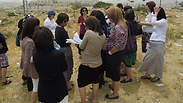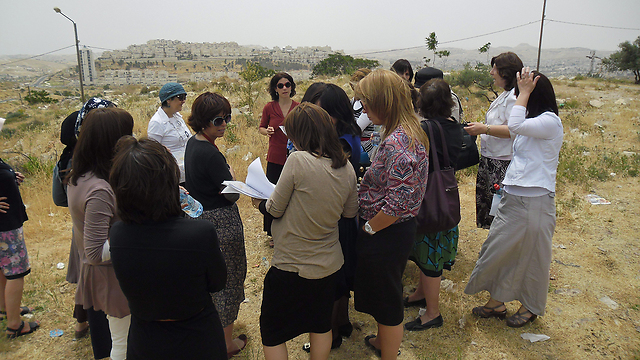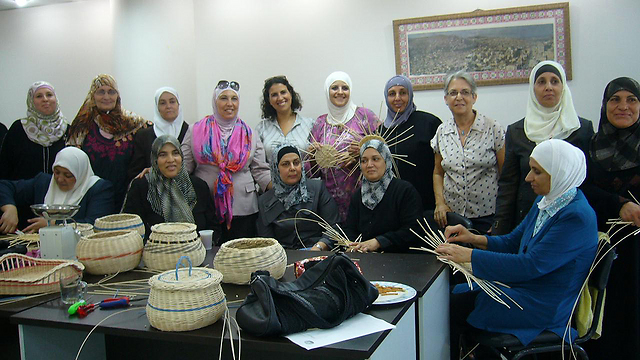
Women are the key to Mideast peace
As the diplomatic process continues to deteriorate, one cannot wonder whether the fact that there are no women at the negotiation table has something to do with it. 'Women need to be among the decisions makers,' activist says.
Kohava Mualmi is a social worker with an MA in conflict resolution, and is working to have more women take part in the peace process. She is a participant in a project called Interpeace that works to increase the involvement of religious women in promoting the peace process.
More than two decades have passed since the Oslo Accords begun, and apart from a minor representation of women (namely the PLO's Hanan Ashrawi, Israel's Tzipi Livni) – official talks hardly included any women at all, let alone religious ones, she says.

Interpeace's women meet (Photo: Interpeace UNDP)
"Women have an important role in solving the Israel-Palestinian conflict. We can manage this conflict in a better way. Men have a hard time bringing the emotional side into the dialogue, compared to women who are able to combine the emotional and the practical."
Can women make a significant contribution to the process just by bringing natural feminine traits to the table? Feminine voices calling to end the ongoing conflict seem to be on the rise, and these voices are being sounded though various projects intended to empower women and give them the tools to promote themselves within their communities.
The Interpeace project seeks to sound the voices of publics usually not heard in regards to the diplomatic process – namely Israeli-Arabs, religious women, immigrants from the former Soviet Union etc. – and works to find a non-violent solution towards the conflict's resolution.
"The project assists the participants in getting acquainted with the other side and have a better understanding of the conflict," says Mualmi.
"We have discovered we see things in a similar way, but from different angles. We have been exposed to new types of information we didn't previously know about. Though our narratives are different, we found a common ground."
Mualmi adds that along with informal gatherings taking place in the field, women in general need to take a more active part in negotiations in light of their natural talent for expressing themselves: "We can complete the missing pieces, because we can express controversial issues in a better way and establish the notion that we are all equal people who want to live a quiet life together in peace".
Narrowing the gaps
Hanan Manadre is a social activist who works with Arab women in their communities, and runs the Sindyanna's Visitors Center in Galilee, a center led by women striving for a social change and seeking to help Arab women without formal education to fulfill themselves and find gainful employment.

Learning handicrafts (Photo: Massimo Alone)
"For any variety of reasons these women have failed to advance and better their situation, so we teach them different handicrafts, because once a women is financially independent, it immediately affects her social status in the Arab society.
"As a result, these women want to make an impact on issues that are considered masculine. Still, it is rare to find women involved in politics, because we are discriminated by the patriarchy."
Part of the Sindyanna Visitor Center activities is facilitating encounters between Arab and Jewish women in a bid to promote dialogue between the two groups. "Each woman arrives with her own personal prejudices, but as the encounter proceeds, the gaps between the women begin to narrow."
"The current policy has led the two people to separatism and extremism, and these types of projects work to bring down the barriers and create a mutual language. Solidarity and closeness are formed in the end of the process."
Manadre believes that because the process involves women, it is easier to hold such an encounter, as women, according to her, are more attentive and create a mutual language based on their personal lives, so when the discussion moves to political levels they have a mutual base to build their dialogue on.
Dramatic feminist decisions
Dr. Tal Dekel, a member of the Achoti (Sister) Organization which deals with social and economical justice for Arab and Sephardic women, thinks that the question 'how can a woman contribute the diplomatic process?' is redundant and outrageous, and would never be posed to men.
"Like any subject, a woman should be represented, but in practice there are exclusion mechanisms that push her out by using ethos, ideologies and interests".
These days, Dr. Dekel is part of a project involving 30 organizations which aim to promote the implementation of UN Resolution 1325, which establishes the commitment of the UN's Security Council to ensure female representation in peace processes and in international politics.
The project is run by Attorney Anat Tahon-Ashkenazi who defines it as "a dramatic decision in the feminist world" and one that connects women to peace and security.
According to Tahon-Ashkenazi, more than 40 states have embraced the resolution and our next move is to have Israel adopt it as well. Women from all sectors and across the political map have taken part in writing the program.
Dr. Dekel and Tahon-Ashkenazi agree that integrating women into the political landscape and in the diplomatic process will take it forward, but according to them "it's not enough just to have more women, they also need to be from various groups and represent different voices."
Women, they claim, should be integrated in decision making process and position, and not just out of democratic view, but out of deep understanding that without a feminine perspective no adequate representation of society can take place.










